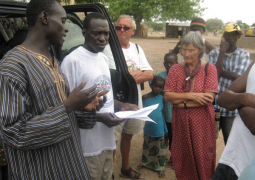A national report issued by the Adult Learning and Education, prepared by the National Technical Committee and coordinated by the Adult and Non-Formal Education Unit, under the Ministry of Basic and Secondary Education has revealed that literacy is still low among females in The Gambia.
The report stated that it is accounted for about 40%, compared to an estimated 64% among the male population.
According to the report, literacy rate in The Gambia for the population aged 10 years and above is estimated at 52.1%.
"The overall literacy rate for the adult population 15 years and above is estimated at 42.5%; 30.6% among women and 55.1% among men", the report stated, outlining some improvement from the 1998 estimates of 48.5% and 25% for men and women, respectively.
The report further stated that this makes the provision of equal opportunity for learning a vital social service to be provided to all individuals as one of the basic rights and a condition for improving the quality of life.
Over the years, the report continued, the government of The Gambia has adopted various policies which provided the main direction for education with addition to the country's Vision 2020, the constitution of The Gambia 1997 and the National Declaration of Education 1998.
The report also indicated that the current education policy commits The Gambia government to upholding the rights of every citizen to basic education, regardless of gender, age, religion or disability.
Accordingly, the report further stated that basic education is open to all, while learning at this level is geared towards holistic development of the individual.
As indicated in the report, the priority goal for Adult Learning and Education in The Gambia is to achieve a 50% improvement in all levels of adult literacy by 2015, especially for women and to reduce imbalances between regions; and between urban and rural areas.
The report stated that it is accounted for about 40%, compared to an estimated 64% among the male population.
According to the report, literacy rate in The Gambia for the population aged 10 years and above is estimated at 52.1%.
"The overall literacy rate for the adult population 15 years and above is estimated at 42.5%; 30.6% among women and 55.1% among men", the report stated, outlining some improvement from the 1998 estimates of 48.5% and 25% for men and women, respectively.
The report further stated that this makes the provision of equal opportunity for learning a vital social service to be provided to all individuals as one of the basic rights and a condition for improving the quality of life.
Over the years, the report continued, the government of The Gambia has adopted various policies which provided the main direction for education with addition to the country's Vision 2020, the constitution of The Gambia 1997 and the National Declaration of Education 1998.
The report also indicated that the current education policy commits The Gambia government to upholding the rights of every citizen to basic education, regardless of gender, age, religion or disability.
Accordingly, the report further stated that basic education is open to all, while learning at this level is geared towards holistic development of the individual.
As indicated in the report, the priority goal for Adult Learning and Education in The Gambia is to achieve a 50% improvement in all levels of adult literacy by 2015, especially for women and to reduce imbalances between regions; and between urban and rural areas.




